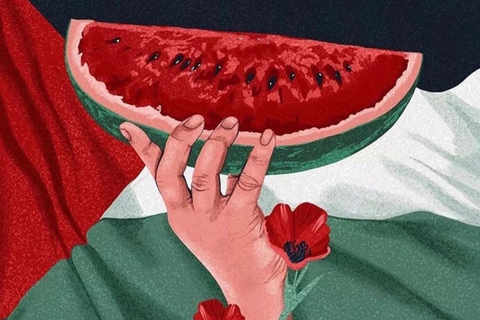
Why watermelon emoji stands for Palestine?
In the digital age, symbols and emojis have taken on new and powerful meanings, becoming shorthand for larger ideas and movements. One such symbol that has recently gained attention is the watermelon emoji 🍉. While at first glance it might seem like an innocent fruit, it has grown to represent something far deeper for Palestinians and their supporters worldwide. This blog post delves into the history and significance of the watermelon emoji as a symbol of Palestinian identity and resistance.
The Historical Context
To understand why the watermelon emoji stands for Palestine, it's essential to look back at the history of Palestinian resistance and identity. In the 1960s and 70s, during times of heightened conflict and occupation, Palestinian symbols and flags were banned by the Israeli authorities. The colors of the Palestinian flag – red, green, white, and black – became dangerous to display openly. In response, Palestinians turned to more subtle forms of resistance and expression.
The Watermelon: A Subtle Resistance
The watermelon, with its red flesh, green rind, black seeds, and white rind, naturally mirrors the colors of the Palestinian flag. During times when displaying the flag could lead to arrest or worse, the watermelon became a covert symbol of national pride and resistance. People would carry or display watermelons as a quiet, non-verbal protest against the occupation and a celebration of their identity.
The Digital Age and the Emoji Revolution
With the advent of social media and digital communication, emojis have become a universal language. They transcend barriers of language and geography, allowing people to communicate complex ideas and emotions succinctly. For Palestinians and their supporters, the watermelon emoji 🍉 has become a digital extension of the historical symbolism of the fruit.
A Symbol of Identity and Solidarity
The use of the watermelon emoji has grown in popularity on social media platforms. It is often used in posts about Palestinian culture, history, and the ongoing struggle for justice and self-determination. By using this emoji, people can show their solidarity with the Palestinian cause in a way that is both simple and powerful. It has become a way to maintain visibility and support in a space where censorship and political pressures are prevalent.
Global Recognition and Impact
The watermelon emoji's association with Palestine has not only caught the attention of social media users but has also been recognized by activists and international organizations. It stands as a testament to the creativity and resilience of the Palestinian people, who have continually found ways to assert their identity and resist oppression, even in the face of severe restrictions.
Conclusion
The watermelon emoji 🍉 is far more than a representation of a delicious summer fruit; it is a symbol of Palestinian identity, resistance, and resilience. It encapsulates a history of subtle defiance against oppression and continues to serve as a digital form of solidarity and cultural pride. As we continue to navigate the complexities of global politics and social media, the watermelon emoji reminds us of the power of symbols in uniting people and sustaining movements for justice and freedom.
By using this simple emoji, we can contribute to a larger conversation and show our support for the Palestinian cause, one post at a time.

Comments (0)
There are no comments for this article. Be the first one to leave a message!